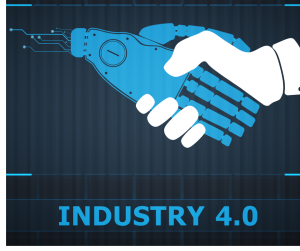

As we near the end of the first decade of Industry 4.0, it’s exciting to see how rapidly the landscape of work is transforming, altering the very fabric of organisational culture. Seamless adoption of AI, robotics and data analytics is reshaping how businesses operate. Yet, no matter how much is automated across the globe, there’s one clear consensus – the future of work is not about humans versus machines, but rather about symbiotic human-machine collaboration.

Skills for the Future: Preparing the Workforce for Industry 4.0
With automation taking over organisations, the demand for uniquely human skills such as creativity, critical thinking, emotional intelligence, and problem-solving has become critical. Hence, organizations must prioritize upskilling and reskilling initiatives to equip their workforce with these crucial competencies for the digital age.
This will augment and support for embracing emerging technologies such as AI, robotics, data analytics, Cloud computing, digital twin, and building competency in these areas is necessary to maximise their benefits. Considering the constant evolution of technology, it is necessary to commit to lifelong learning and continuous professional development. Upskilling programs should however not just focus on technical skills but also on soft skills that foster effective collaboration, adaptability, and innovation. A continuous learning program has become embedded into the organizational culture so employees are capable of navigating the evolving demands of Industry 4.0. By investing in the key skills of their workforce, organizations can future-proof their operations.
Socio-economic Implications and Change Management in Industry 4.0
Industry 4.0, in spite of evolving dramatically, has not been able to assuage the one biggest fear it brought in – the fear of job displacement. A phenomenon that started because of the widespread belief that machines will take over humans’ work changed into a more realistic fear of widening skills gap between youngsters and older staff. Across the globe, this fear is leading to a huge resistance to change among employees, and this will continue unless organizations proactively address all such concerns through transparent communication , stakeholder engagement by fostering and supporting skill building of resources.
Organisations must also focus on a robust change management program that prepares employees for technological shifts while ensuring that the transition is inclusive and seamless. This could include retraining programs, career counselling services, or implementing human-first policies and technologies.
Utilization of Digital Tools for Enhanced Training and Knowledge Management
Since Industry 4.0 is omnipresent, using it to facilitate training and knowledge management is the smart choice. AR and VR offer immersive learning experiences by simulating real-world scenarios. Digital twins are used to create virtual replicas of physical assets, enabling hands-on training, predictive maintenance and performance optimization. Collaborative platforms offer a hub for employees to share information, collaborate on personal and professional projects, and access training materials anytime, anywhere. By leveraging these (and other) tools, organizations can create an agile environment where people can learn, work and grow at their own pace from a place of their own choosing. All this can then be further strengthened using data analytics.
Industry 4.0 Readiness Assessment
Today, as we are at the cusp of an era where innovation is all about augmenting human potential, it’s crucial to assess our readiness for embracing these innovations and getting ready for it. The Smart Industries Readiness Index (SIRI) is a Globally accepted framework for manufacturing companies to analyse and understand where there organisation is, as far as Industry 4.0 readiness is concerned. SIRI includes frameworks and tools that help manufacturing organisations start, scale up, and sustain their Industry 4.0 transformation process with a direction based on Industry benchmarks, KPI and ROI.
In India, this is where Pasona plays a critical role. It handholds and guides organisations through the entire SIRI journey, from consulting on assessments, framework design, end-to-end lifecycle management to training on the entire industry 4.0 journey as well as recruitment of the right personnel to get the organisation ready.

Our certified SIRI assessor and digital transformation consultants guide organisations and ensure they are ready not just for the assessment but for the entire transformation process to create a mutually beneficial synergy between humans and machines. The future lies in striking the perfect balance between automation and human expertise to create human-centric automation. Are you ready for it?
 Created By
Created By